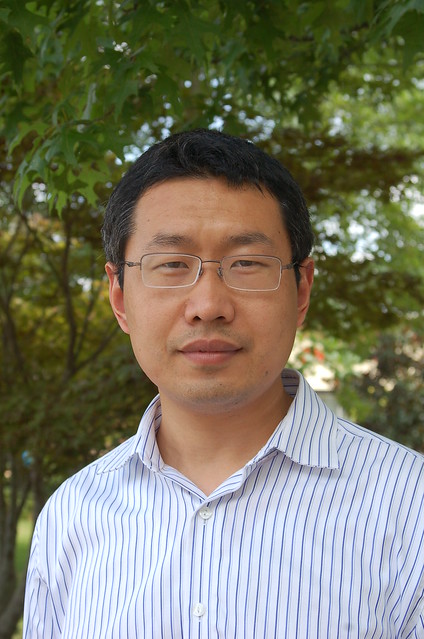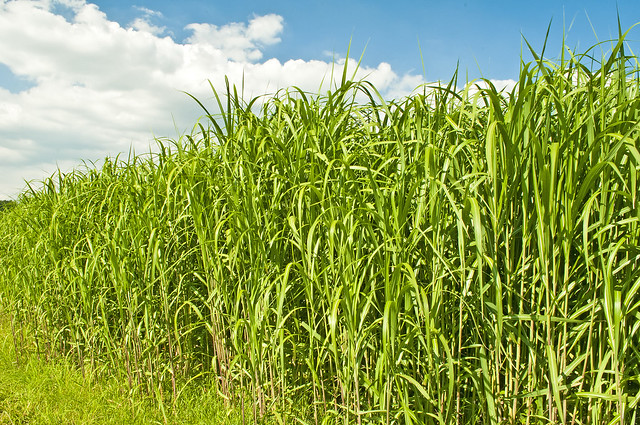Auburn research to help expand bioenergy markets
Article body
Auburn University researchers are hoping to reduce some of the risks and uncertainties of growing biomass crops with a project that focuses on the socioeconomic implications and public policy challenges of bioenergy market development and expansion.
Biomass crops are typically densely planted, high-yielding species with the potential to be processed into biofuel to generate power. The production of these crops has been hampered in the past by a lack of information about potential yields and marketability.
The project at Auburn is supported by a three-year, $499,886 grant—one of 34 grants totaling $15.1 million that the U.S. Department of Agriculture's National Institute of Food and Agriculture has awarded in the past year for research on renewable energy, bio-based products and agroecosystems.
The grants, which are funded through the agency's Agriculture and Food Research Initiative, are expected to help develop the next generation of renewable energy, bioproducts and biomaterials; protect the ecosystems that support agriculture; and improve the agricultural systems and processes that help feed the nation.
"The emerging cellulosic biofuel and bioproducts industry will require the development of markets where technological and demand uncertainty is high," said Ruiqing Miao, assistant professor in the Auburn College of Agriculture's Department of Agricultural Economics and Rural Sociology and lead researcher for the project. "Economic and policy challenges need to be overcome for farmers to successfully become viable suppliers of biomass."
The research study has three components.
"First, we are working to identify the economic barriers to biomass production," he said. "We'll also evaluate the effectiveness of the federal government's Biomass Crop Assistance Program in stimulating biomass market expansion. In addition, we'll explore the economic and ecosystem service implications of biomass production."
In identifying economic barriers to biomass production, Miao and his team will look at the profitability and risk of production to farmers. Specifically, they will assess corn stover, miscanthus, switchgrass and energy cane, measuring the ecological impacts of each production system.
"There is currently no commercial production for these crops," Miao said. "A crop might be profitable in one county but not profitable in another. We want to inform farmers about the profitability of growing these crops while at the same time look at the environmental benefits."
His research team will use a model that simulates yield using climate information and soil quality. Risk will be based on yield variation.
"We also want to measure the emissions so we can quantify the ecosystem effect derived from the biomass production," Miao said. "This is to ensure that the crop being grown is environmentally friendly."
Another part of the research will analyze the effectiveness and efficiency of subsidies provided by the biomass assistance program. The program was authorized in the 2008 Farm Bill and then reauthorized in 2014 to provide financial assistance to owners and operators of agricultural and nonindustrial private forest land who want to establish, produce and deliver biomass feedstocks.
The USDA program provides matching payments when producers sell their crop along with establishment and annual payments. Farmers participating in the program can also get payments that help offset some of the cost of experimenting with growing crops for bioenergy production.
"This program is intended to promote the cultivation of bioenergy crops that show promise for producing highly energy-efficient, advanced bioenergy or biofuels, and to develop those new crops and cropping systems in a manner that preserves natural resources," Miao said. "Currently, matching payments are provided at $1 for $1, up to $20 per dry ton."
Researchers also will use an economic decision model to analyze farmers' willingness to adopt bioenergy crops.
"This research will give farmers more information about profitability, providing a basis for decision-making when it comes to growing biomass crops," he said. "Policymakers also will have more information about the environmental benefits of these crops. We will provide both a conceptual and simulation modeling framework and a rich database as a publically available resource to the research community in the area of bioeconomic and policy analysis."
The project began in May 2017 and will end in 2020. Working with Miao are University of Illinois professors Madhu Khanna, an agricultural economist, and biologist Evan DeLucia.
Related Media
Media interested in this story can contact Communications Director Preston Sparks at (334) 844-9999 or preston.sparks@auburn.edu.
Auburn University is a nationally ranked land grant institution recognized for its commitment to world-class scholarship, interdisciplinary research with an elite, top-tier Carnegie R1 classification, life-changing outreach with Carnegie’s Community Engagement designation and an undergraduate education experience second to none. Auburn is home to more than 30,000 students, and its faculty and research partners collaborate to develop and deliver meaningful scholarship, science and technology-based advancements that meet pressing regional, national and global needs. Auburn’s commitment to active student engagement, professional success and public/private partnership drives a growing reputation for outreach and extension that delivers broad economic, health and societal impact.






